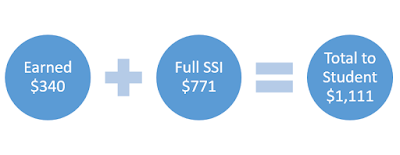 Unlike sales
that promise to put money back into your pocket, this Social Security work
incentive can actually do just that! This almost-too-good-to-be-true work
incentive allows some students receiving SSI who are under age 22 and regularly
attending school to have income excluded when Social Security adjusts their SSI
check monthly.
Unlike sales
that promise to put money back into your pocket, this Social Security work
incentive can actually do just that! This almost-too-good-to-be-true work
incentive allows some students receiving SSI who are under age 22 and regularly
attending school to have income excluded when Social Security adjusts their SSI
check monthly.Essentially, the Student Earned Income Exclusion decreases the amount of countable earned income so the student can keep more of their SSI check and also have their earnings from work.
Oftentimes, this allows students
to test their ability to work and keep their whole SSI check. For example,
Trevor worked full-time over the summer at his local community pool and earned
$1,376 per month and was also able to keep his full SSI check!
Almost Too Good to Be True
If an SSI
recipient under 22 is working while pursuing education, the Student Earned
Income Exclusion could be an option. The exclusion is applicable to students:
- in grades 7-12 attending school at least 12 hours a week (this includes those who are being homeschooled, getting homebound instruction, or attending an online school)
- in a college or university for at least eight hours per week
- in training to prepare for a paying job for at least 15 hours per week if the course involves shop practice or hands-on activities, or
- in training to prepare for a paying job for at least 12 hours per week if it does not involve shop practice
Allowances
may be made for fewer hours of instruction than indicated above for reasons
beyond the student's control, such as attendance, illness, or any circumstances
that justify the reduced credit load.
The amount of income a student can
exclude monthly and annually is adjusted every year, but these amounts are
shockingly high. In 2019, the monthly gross earned income a student can exclude
is $1,870 and up to a maximum annual exclusion of $7,550! With limits this
high, it’s not surprising that the majority of students who are working are under
this monthly limit and able to keep their entire SSI check!
Maintaining Benefits While Learning and Earning
For example, a student working 10
hours a week after school and earning $8.50 per hour would have about $340
in gross income from work. By using the
Student Earned Income Exclusion, they could keep their entire SSI check of $771
(if receiving the Full Benefit Rate) + $340 from work = $1,111. Total!!
Now that really is an incentive to work! Students often have no problem
spending this extra money but saving in an ABLE account, Trust, or Plan for
Achieving Self-Support are great options to save without jeopardizing their
eligibility for Medicaid.
As you can see in the example below, a working student receiving the Full Benefit Rate of $771 and earning $340 in one month could keep both the SSI and the paycheck. Every working student should explore this incentive.
When students are first starting out in the workforce, it’s
important for them to make the critical connection between how working and
earnings can equate to a better quality of life. This incredible work incentive
is a great way for them to have the opportunity to feel the benefits of working
and having more money to spend! By allowing transition-age youth to work while keeping
more of their benefit, they can experience life above the base SSI rate. Once a
student experiences how having more money enriches their lives, they begin to
develop a work habit rather than a dependence on benefits. This can have a
powerful impact at a critical juncture for these students.
For students who work a part-time job during the school year or
just over the summer, simply telling Social Security that they are a student can
equate to MORE money! Being in school really is cool.
As you can see in the example below, a working student receiving the Full Benefit Rate of $771 and earning $340 in one month could keep both the SSI and the paycheck. Every working student should explore this incentive.
Resources for the Student Earned Income Exclusion
Program Operations Manual System (POMS)
Student Earned Income Exclusion for SSI
